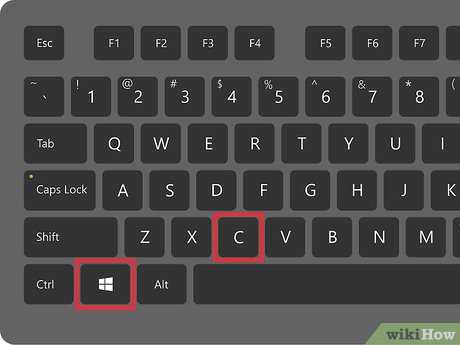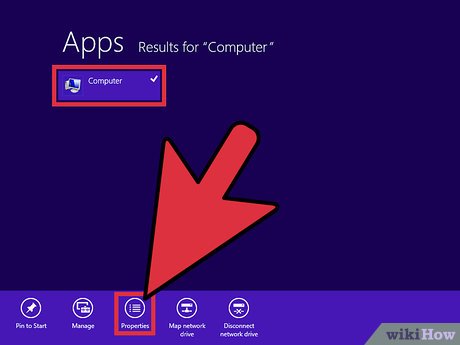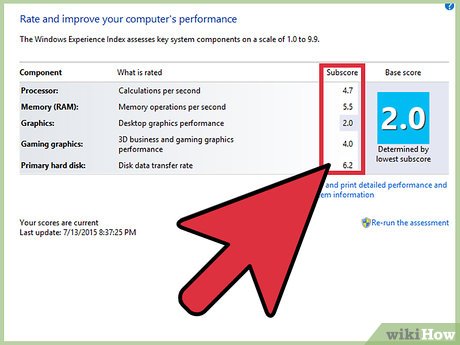How to Check System Performance in Windows 8
Method 1 of 2:
Using Windows Experience Index
-
 Press WINKEY+C to open up the charm menu. Click the Search charm
Press WINKEY+C to open up the charm menu. Click the Search charm -
 Type in Computer and right click the result. Click Properties.
Type in Computer and right click the result. Click Properties. -
 The rating column shows you the overall score of your computer with the Windows Experience Index. Click on "Windows Experience Index" to get more information about your system
The rating column shows you the overall score of your computer with the Windows Experience Index. Click on "Windows Experience Index" to get more information about your system
Method 2 of 2:
Using Resource Monitor
-
 Press CTRL+SHIFT+ESC to open up Task Manager.
Press CTRL+SHIFT+ESC to open up Task Manager. -
 Click the Performance Tab. This will show basic information about the performance of your system. Click the Open Resource Monitor for more advanced information about your system.
Click the Performance Tab. This will show basic information about the performance of your system. Click the Open Resource Monitor for more advanced information about your system. -
 Locate the five tabs that are open in Resource Monitor. The first tab is an overview, it allows you to see the running processes and cpu usage, the disk I/O and highest active time, network I/O and network utilization, as well as memory usage and used physical memory.
Locate the five tabs that are open in Resource Monitor. The first tab is an overview, it allows you to see the running processes and cpu usage, the disk I/O and highest active time, network I/O and network utilization, as well as memory usage and used physical memory. -
 Press the CPU tab. This tab will let you see each individual core as graphs on the right. On the left, you will see running processes and services on your machine. Select a process or service to see Associated Handles and Associated Modules.
Press the CPU tab. This tab will let you see each individual core as graphs on the right. On the left, you will see running processes and services on your machine. Select a process or service to see Associated Handles and Associated Modules. -
 Click on the Memory tab. This tab has information about the memory usage of your system. The graphs on the right indicate the amount of used memory, the commit charge, and the amount of hard faults per second.
Click on the Memory tab. This tab has information about the memory usage of your system. The graphs on the right indicate the amount of used memory, the commit charge, and the amount of hard faults per second. -
 Press the Disk Tab. This tab is for information regarding your disk drive. The graphs on the right show the activity, and the queue time. You can see information regarding disk activity and which processes have disk activity.
Press the Disk Tab. This tab is for information regarding your disk drive. The graphs on the right show the activity, and the queue time. You can see information regarding disk activity and which processes have disk activity. -
 Press the final tab to see information regarding networking. This tab lists various connections on the right as graphs. It also shows which processes on your computer are using network I/O. You can see the TCP (Transfer Control Protocol) Connections. And finally, you can see which processes are listening on specific ports.
Press the final tab to see information regarding networking. This tab lists various connections on the right as graphs. It also shows which processes on your computer are using network I/O. You can see the TCP (Transfer Control Protocol) Connections. And finally, you can see which processes are listening on specific ports.
Share by
Marvin Fry
Update 04 March 2020
You should read it
- ★ How to prevent Microsoft Edge from running too many processes on Windows
- ★ How to Activate Safe Mode in Windows 10
- ★ How to manage running processes with XFCE's Task Manager
- ★ 10 Tips for securing your personal information on the internet
- ★ How to use the htop command to monitor system processes in real time









